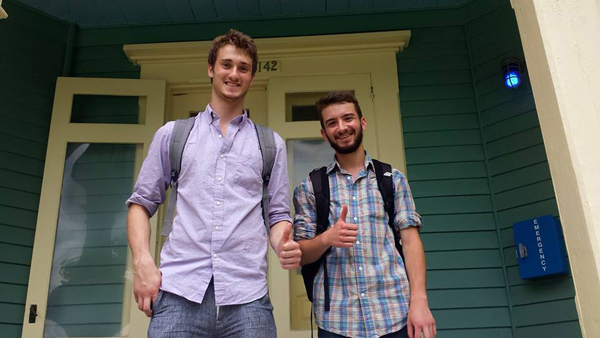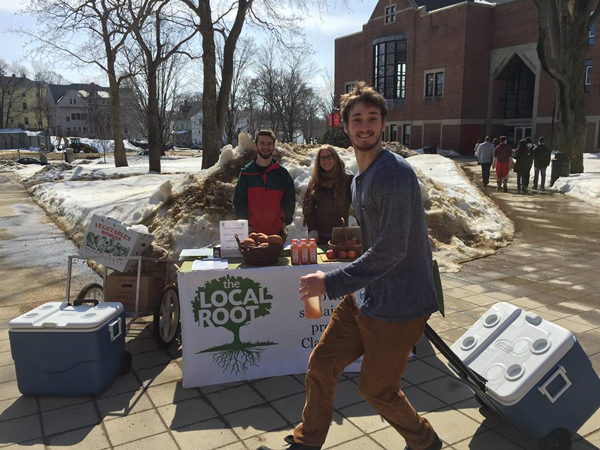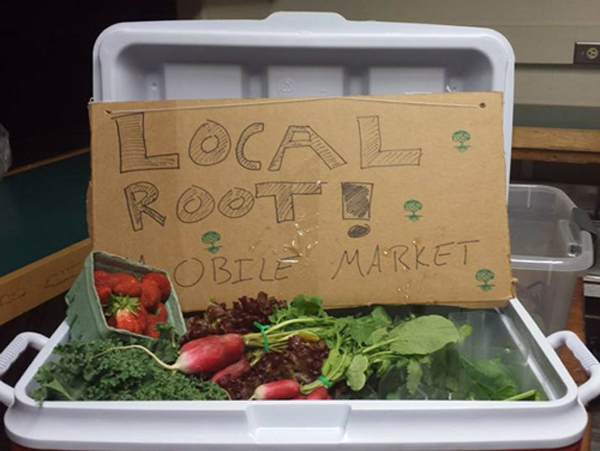
By Wendy Linden It’s Wednesday. I’m sitting at my desk on the Clark University campus at 138 Woodland Street, and I hear the familiar sound of the cart approaching. The Local Root is here! This week’s selection includes Fuji apples, organic greens, radishes, garlic, broccoli, red onions, red beets, multi-colored carrots and apple cider. There’s even a new promo: If I buy a Local Root tote bag I’m a Rooties Club member. That means every time I shop with my tote bag, I get free produce. This is irresistible. I admit it, I’m a foodie. I was one of Local Root’s original customers. When Clark undergrads Harrison Bass ’13, Baran Cansever ’12, Hannah Galgiani ’12, Rachel Minsky ’12, Laura Overton ’12, and Annie Rosenthal ’12 won first place in the Clark University Innovation & Entrepreneurship Big Idea Challenge—aptly named Ureka!—in spring 2012, The Local Root was born. These enterprising seniors collaborated with the I&E Department and Clark’s Sustainability Director Jenny Isler, an expert foodie herself, to launch their big idea: to start an organic farm stand and community supported agriculture (CSA) delivery service on campus with locally grown vegetables.

Using the $2,500 Ureka! seed funding (no pun intended) and an additional $20,000 from the Undergraduate Student Council, The Local Root began operations in fall 2012. I signed up and couldn’t wait for my Wednesday CSA box delivery—fresh veggies delivered right to my office! Let the Wednesday dinner planning begin. But it’s not just about the local produce—I am impressed with how Clarkies run this veggie venture. True to Clark’s own mission, the Clarkies running The Local Root aren’t afraid to “challenge convention,” embrace change, and innovate. The current company managers — Eli Goldman ‘16 (Manager of Internal Operations), Tyler Collins ’15 (Financial Manager), and Duncan Hardy ’16 (Manager of External Operations) —tell me that The Local Root used to contract solely with one local farmer as a CSA pass-through. After the startup’s first year in business, and some research into the supply chain, the student execs discovered a local distributor, Lettuce Be Local, and The Local Root’s business model evolved. To increase student outreach, a weekly Wednesday farm stand in Red Square and a mobile market were added in 2014 — and sales have soared. That’s where the sound of The Local Root cart rolling up to my office building comes in.

Goldman also tells me that the culture at Clark is perfect for startups. “The faculty and staff in the Innovation & Entrepreneurship (I&E) program and the Clark Sustainability office provide a wealth of resources to help us operate week to week. Without close contact, meetings, and advice from our faculty mentors, The Local Root would not be where it is today.” A lot of that credit goes to Amy Whitney, Director of the I&E program and faculty mentor to Clark student entrepreneurs. I’ve seen Amy in action, so I know it’s true. Her door is always open to students, helping them secure funding, create organizational charts, hone management skills and troubleshoot the day-to-day challenges of running a business. Clarkies are lucky to have Amy around because she is also a LEEP Adviser. That means she really gets it—what her students study in the classroom goes hand-in-hand with their real-world startup experiences. Connecting those two ways of learning is the very heart of LEEP. Hardy definitely gets that LEEP-y connection. “We take material from accounting classes, geography classes, entrepreneurship classes, and apply it to our holistic and long-term vision of The Local Root,” he explains. Whitney’s and Isler’s mentorship has also helped them realize that they are using their leadership, creativity and problem-solving skills everyday while running The Local Root, he adds. I couldn’t have described LEEP outcomes better myself. I am confident in the future of The Local Root—and in the future of these three impressive Clarkies.
